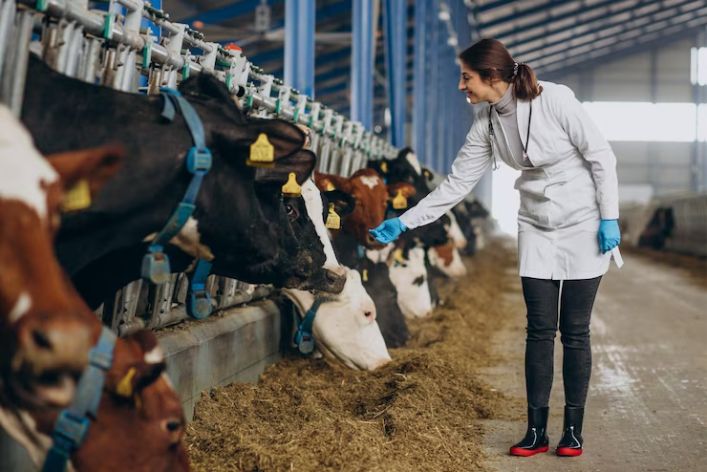Introduction
Aquaculture is the farming of fish, crustaceans, molluscs, and other aquatic organisms. It’s an essential practice with varying benefits, including food security and job creation in Nigeria.
In this blog post, we’re going to explore the prospects of aquaculture as a career in Nigeria.
With the increased demand for seafood and the decline in wild fish populations, aquaculture provides a sustainable solution.
The industry is on the rise in Nigeria, and that opens up various career opportunities for young Nigerians.
By the end of this blog post, you’ll have an in-depth understanding of aquaculture and its potential as a career path.
Read: The Rise of Agri-tech Jobs in Nigeria’s Economy
Overview of Aquaculture Careers in Nigeria
Aquaculture, also known as fish farming, is a rapidly growing industry in Nigeria with great potential for creating significant employment opportunities.
Below we will explore different types of aquaculture careers, the current state of aquaculture in Nigeria, and growth potential of the industry.
Types of Aquaculture Careers
- Hatchery Jobs: These jobs involve raising and breeding fish from eggs to fingerlings for sale to fish farmers. Some of the jobs in hatcheries include biologists, fishery technicians, and managers.
- Fish Farm Jobs: This involves managing and raising fish on farms and other culture systems. Jobs in fish farming include farm managers, technicians, and assistants.
- Processing Jobs: After fish are harvested, they need processing. This involves sorting, cleaning, scaling, gutting and packaging. Jobs in processing include quality assurance specialists, food processors, and production supervisors.
- Marketing and Sales Jobs: Marketing and sales jobs in aquaculture involve promoting and selling the fish products both domestically and internationally.
Current State of Aquaculture in Nigeria
The fish industry is a significant contributing factor to Nigeria’s economy as it is viewed as a critical sector that provides employment as well as contributes immensely to the country’s food security.
Aquaculture is a significant part of the fish sector and has grown consistently over the years. As at 2016, Nigeria was ranked sixteenth in global aquaculture production accounting for about 1.1% of the total global production.
The industry has contributed significantly to job creation through various farming systems such as ponds, tanks, and cages, among others.
Growth Potential of Aquaculture in Nigeria
Nigeria is well-situated for fish farming profitable as it has various bodies of water suitable for aquaculture. The country has large inland water bodies such as lakes, rivers, dams, and reservoirs, along with over 853 kilometers of coastline.
The potential yields of the aquaculture industry in Nigeria are enormous, and the country has not even scratched the surface on what it can do with the industry.
The Nigerian Government is investing in aquaculture through various initiatives and policies such as the Aquaculture Value Chain Development Program.
Private investors, foreign direct investments, and local farmers have been involved in growing the industry. The country stands a high chance of becoming a leader in fish production in Africa if efforts by all stakeholders are combined vigorously.
The aquaculture industry in Nigeria has enormous potential, and with the right investments and initiatives, the sector could play a significant role in the country’s economy.
Different types of careers in aquaculture range from hatchery jobs to marketing and sales jobs, and there are enormous opportunities for growth. If all stakeholders involved in the aquaculture industry come together, Nigeria has the potential to become a leading producer of fish in Africa.
Read: Role of Agriculture in Nigeria: Career Opportunities
Requirements for a Career in Aquaculture in Nigeria
Education and Training Requirements
In order to pursue a career in aquaculture, it is important to have a solid educational background. A Bachelor’s degree is usually the minimum requirement for most aquaculture jobs in Nigeria.
Specializations in related fields such as fisheries, marine biology, aquaculture, or environmental science can also be helpful.
Some universities in Nigeria offer degree programs specifically in aquaculture. These programs can provide students with hands-on training in areas such as fish breeding and fish health management.
Skills Needed for Aquaculture Careers
Aside from education, there are certain skills that are essential for success in an aquaculture career. These skills include:
- Attention to detail
- Good communication skills
- Ability to work well in a team
- Strong problem-solving skills
- Good organizational skills
- Physical stamina and agility
- Adaptability and flexibility
Having these skills can make you a more competitive candidate in the job market and help you succeed in your career.
Necessary Certifications and Licenses
Aquaculture careers in Nigeria necessitate specific certifications and licenses, such as certification by the Nigerian Veterinary Medical Association for fish health management.
The National Agency for Food and Drug Administration and Control (NAFDAC) regulates aquaculture operations, so obtaining permits and licenses is crucial.
To pursue a successful career in aquaculture, you need a Bachelor’s degree in a related field, relevant skills, and the required certifications and licenses. Nigeria’s abundant water resources offer significant growth potential in aquaculture.
By fulfilling requirements and staying updated, you can seize opportunities and thrive in the industry.

Top Aquaculture Careers in Nigeria
Aquaculture in Nigeria offers lucrative career paths in fish farming, feed production, vegetation management, and equipment manufacturing.
Fish farmers cultivate fish, maintain optimal conditions, and reduce dependence on imports. Aquaculture feed production involves specialized diets from companies like Skretting and Aller Aqua.
Aquatic vegetation management professionals control plant growth in fish farms. Aquaculture equipment manufacturing provides essential tools like water heaters and filters.
The industry presents employment opportunities for motivated individuals and contributes to Nigeria’s economic growth. Continued support from the government and private investors ensures sustainable development in aquaculture.
Read: Changing Nigeria: Careers in Sustainable Agriculture
Challenges in Aquaculture Careers in Nigeria
Aquaculture careers have a lot of potential in Nigeria, with its abundant water resources. However, there are several challenges that hinder the growth and development of the industry:
- Inadequate funding: A lack of financial support from the government and investment institutions is a significant obstacle in the expansion of aquaculture businesses.
- Limited access to technology and equipment: Most Nigerian farmers rely on traditional and outdated methods of fish farming, which limits the production output and hinders the industry’s growth potential.
- Environmental concerns and regulations: Regulations on the use of chemicals and the disposal of waste in fish farms are often not well enforced, leading to environmental degradation and health concerns for workers and consumers.
These challenges must be addressed to create an enabling environment for aquaculture businesses to thrive in Nigeria.
See Related Content: Nigeria’s Pioneering Dairy Producers: Success Stories
How to Excel in Aquaculture Careers in Nigeria
As the world’s population grows, so does the demand for fish and other aquatic products. Nigeria, with its abundant water resources, is poised to become a major player in the lucrative aquaculture industry. If you’re interested in pursuing a career in this field, here are some tips on how to excel:
Engage in Continuous Education and Training
- Keep up with the latest developments in aquaculture technology and techniques.
- Attend conferences, workshops, and seminars to learn from industry experts.
- Take courses in related fields such as biology, aquatic sciences, and business management.
- Seek out mentorship opportunities with experienced professionals in the field.
Network with Other Professionals in the Industry
- Join professional associations and organizations like the Nigerian Institute of Oceanography and Marine Research (NIOMR) and the Fisheries Society of Nigeria.
- Attend industry events and conferences to meet people in the field.
- Participate in online forums and social media groups to connect with other professionals and share knowledge and resources.
- Develop relationships with suppliers, buyers, and other stakeholders in the industry.
Stay Current with Industry Trends and Best Practices
- Keep yourself informed about the latest regulations and policies governing the industry.
- Read industry publications and news sources to stay up-to-date with trends and developments.
- Follow industry leaders on social media to learn from their experiences and insights.
- Continuously evaluate your practices and processes to ensure they are efficient, sustainable, and ethical.
With the right education, training, networking, and knowledge, you can excel in an aquaculture career in Nigeria and contribute to the growth and profitability of the industry. Remember to stay committed, curious, and open-minded as you pursue your goals in this exciting and rewarding field.
Read: Making a Living: Poultry Farming Careers in Nigeria
Conclusion
Aquaculture offers vast opportunities for Nigeria’s socio-economic development, including poverty reduction and food security.
Career options in production, management, marketing, research, and innovation exist. Entrepreneurs with relevant education and skills can excel.
Understanding the aquaculture value chain is crucial, along with supportive government policies and access to credit. As the demand for aquatic products grows, individuals should explore career opportunities in aquaculture.
Adaptability, skill updates, and thinking outside the box are essential. Aquaculture contributes to Nigeria’s sustainable development, creating jobs and generating foreign exchange. Individuals can drive economic growth by seizing industry opportunities.




